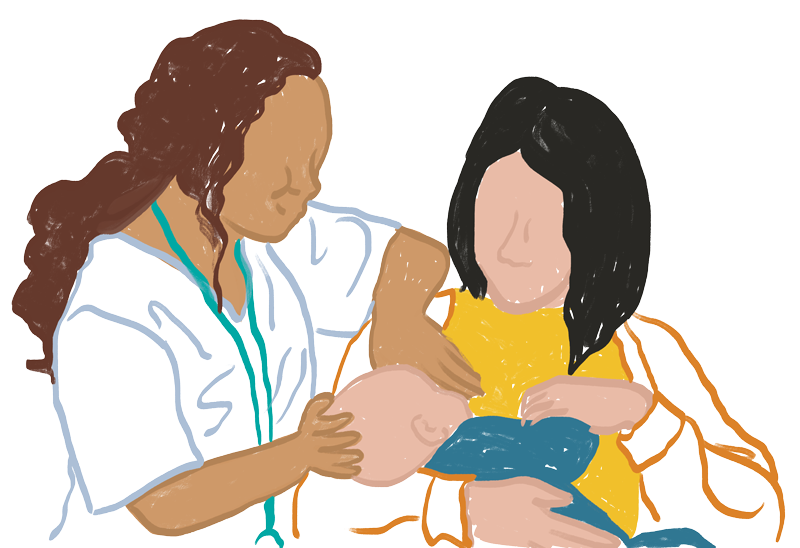Breastfeeding
If you decide to breastfeed your baby, it is important to work with a knowledgeable healthcare team who can monitor your health and support you and your baby. Canadian guidelines recommend several things that can help prevent passing HIV to your baby while breastfeeding. Read on to learn about these recommendations.

HIV medication for you and your baby
It is very important to keep taking your HIV medication consistently when your baby is born. Taking your medication is good for your health. It is also the most important thing you can do to reduce the chance of HIV passing to your baby when you breastfeed.
When you have a new baby, you may be sleep deprived and you may lose track of time. This can make it difficult to take medication on a regular schedule. It can be helpful to set an alarm as a reminder. You can also use a pill organizer or ask your pharmacist to package your medication in blister packs, so that you can check if you have taken your medication each day. If you are having trouble taking your medication, talk to a healthcare provider.
To further reduce the chance of passing HIV, it is recommended that your baby be given HIV medications as well. These medications are given to your baby throughout the time that you are breastfeeding, and for another month afterwards. They are safe for babies to take.
Medical appointments for you and your baby
During the time that your baby is breastfeeding it is recommended that you have an appointment once every month. At these appointments, you will have a viral load test to make sure that your HIV treatment is working. Your baby will also be tested for HIV frequently while you are breastfeeding to make sure that they are still HIV negative. They will also be monitored for drug side effects. These appointments are an opportunity for a healthcare provider to check how you are doing and for you to ask any questions that you have.
Breast care
Keeping your breasts healthy will be more comfortable for you and may help reduce the chance of passing HIV to your baby. If you experience cracked nipples or mastitis (inflammation in your breast, sometimes caused by an infection), this might increase the chance of HIV passing to your baby.
It can be helpful to get support from a lactation consultant. Lactation consultants are healthcare providers who specialize in breastfeeding. They can help to show you how to get your baby to latch properly, which can reduce the chance of your nipples cracking or bleeding.
If one of your nipples becomes cracked or you think you might have mastitis, it is recommended that you stop breastfeeding from that breast until it is resolved. If you think you might have mastitis, talk to a healthcare provider right away to get treatment for the infection. They will give you advice about what to do until the issue is resolved.

Limiting how long you breastfeed for, and switching to formula before introducing solid foods
You can reduce the chance of passing HIV by breastfeeding for a shorter time period. Breastfeeding for only a few weeks or months has a lower risk of passing HIV than breastfeeding for six months or longer.
There may be a higher chance of passing HIV if you start feeding your baby solid foods in addition to breastmilk. This is sometimes called mixed feeding. Because of this, some experts recommend that you consider switching to formula before introducing solid foods. Solid foods are normally introduced when a baby is four to six months old. Talk to a healthcare provider about your plans for when you will stop breastfeeding. They can give you advice on how to wean your baby off of breastmilk.
Legal considerations
Guidelines for healthcare providers on HIV and infant feeding recommend that a person with HIV should not be reported to child protective services for breastfeeding, if there is no significant risk of passing HIV to the baby. Following your healthcare provider’s advice about how to breastfeed as safely as possible is important to help prevent any potential legal consequences of breastfeeding.
If a healthcare provider feels that there is a significant risk of passing HIV to a baby, they might contact child protective services. For example, this might happen if you breastfeed while you have a detectable viral load, if you regularly miss medical appointments while breastfeeding, or if you breastfeed without the support of a healthcare provider.
Some healthcare providers are not familiar with the recommendations about breastfeeding for people living with HIV. It can be helpful for you to print out a copy of the Canadian guidelines when you are going to see a new healthcare provider. You can find a copy of these guidelines at catie.ca/infant-feeding.
It can also be helpful to sign an agreement with your HIV doctor, so that you have a document that shows that you are breastfeeding with the knowledge and support of your doctor.
If you are contacted by police or child protective services related to your choice to breastfeed, you can get support. Visit whereto.catie.ca to find HIV organizations and legal services near you.
